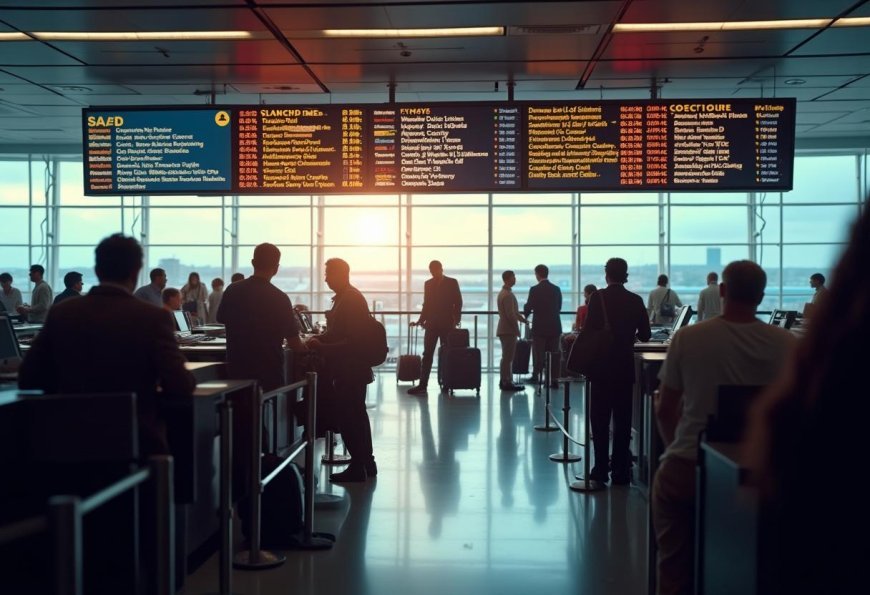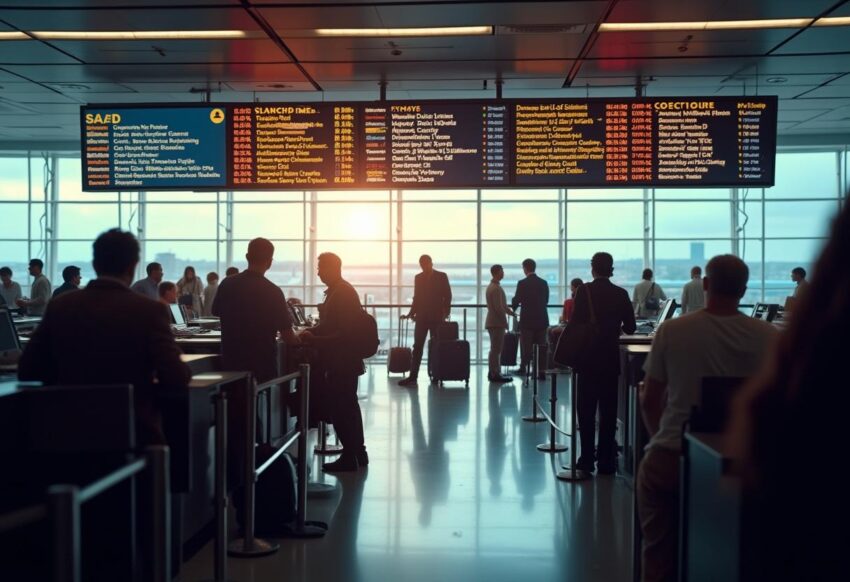US Travel Disrupted As More Than 70 Flights Grounded And Multiple Delays At Denver International Affect Major Cities Including New York, Los Angeles, And Chicago


Travel disruptions at major U.S. airports have reached worrying levels. Over 800 flights were affected, leading to widespread frustration among passengers. Denver International Airport (DEN), New York’s John F. Kennedy International (JFK), Dallas-Fort Worth International (DFW), and San Francisco International (SFO) were among the worst hit, suffering from major delays and cancellations. At Denver International, there were a total of 882 delays and 79 cancellations, disrupting travel to big cities like New York, Los Angeles, Dallas, and Chicago. This left many passengers stranded or needing to change their travel plans. SkyWest Airlines was the most affected, with 63 cancellations (13% of the total) and 161 delayed flights (34% of all delays). United Airlines and Delta Air Lines also faced serious issues. United reported 318 delays (46% of all delays), while Delta had 27 delayed flights, impacting 40% of their scheduled departures. Travelers should stay informed and regularly check their flight status to manage the ongoing disruptions, as weather conditions and staffing issues continue to affect airport operations.
Flight Cancellations: Top Airlines and Affected Routes
SkyWest and United Airlines experienced the most cancellations among U.S. carriers. SkyWest, a regional airline, canceled 13% of its flights, while United Airlines had a 1% cancellation rate. Delta Air Lines, Southwest Airlines, and American Airlines were also affected, but less so.
- SkyWest: 63 cancellations (13% of total flights)
- United Airlines: 7 cancellations (1% of total flights)
- Delta Air Lines: 4 cancellations (5% of total flights)
- Southwest Airlines: 2 cancellations (0% of total flights)
- American Airlines: 2 cancellations (4% of total flights)
Other airlines, like Frontier, British Airways, and Icelandair, saw few cancellations, with only one or two flights affected. Despite these small numbers, larger airlines felt a bigger impact due to the volume of passengers they handle during peak travel times.
Delays and Operational Strain at Major U.S. Airports
Passengers faced frustration not only from cancellations. Delays were also widespread at major U.S. airports. Denver International (DEN) reported 458 delayed flights, amounting to 45% of its scheduled departures. New York’s JFK had 426 delays, while San Francisco International (SFO) and Los Angeles International (LAX) followed closely.
- Denver International (DEN): 39 cancellations, 426 delays (45%)
- New York JFK (JFK): 41 cancellations, 458 delays (39%)
- Dallas-Fort Worth International (DFW): 6 cancellations, 300 delays (55%)
- San Francisco International (SFO): 2 cancellations, 10 delays (58%)
- Los Angeles International (LAX): 1 cancellation, 4 delays (66%)
Delays often stem from factors like bad weather, air traffic control issues, and ongoing staffing shortages. The mix of canceled flights and long delays has created a difficult situation for passengers, many of whom struggle to find alternative flights or rebook.
Why Are These Cancellations and Delays Happening?
Several reasons contribute to the high rate of cancellations and delays. A key factor is that the airline industry has not fully recovered from the pandemic. Staffing shortages limit flight frequencies and create operational challenges, worsening delays when unexpected problems occur.
Weather issues have also played a role, especially in places like Denver and Dallas, where storms disrupted flight schedules. Additionally, air traffic congestion at major hubs can cause delays, particularly in the busy summer months, as airlines manage the flow of aircraft.
Tight flight schedules and increased summer demand add to the high rate of delays. With fewer flights to accommodate last-minute travelers, airlines often have to make quick decisions, which can lead to cancellations.
Travel Tips to Navigate Disruptions
For travelers dealing with cancellations and delays, here are some steps to lessen the inconvenience:
- Plan Ahead: If possible, book flights during off-peak hours when demand is lower, and the chances of cancellations or delays are reduced.
- Check Flight Status Regularly: Stay informed about your flight status and any possible changes through your airline’s app or website.
- Use Travel Insurance: Insurance can help cover extra costs from flight disruptions, like hotel stays and meals.
- Consider Alternative Routes: If your flight is canceled, check with the airline for alternate routes or nearby airports for rerouting.
- Be Flexible: Being flexible with your travel dates and times can help you steer clear of peak times when disruptions are likely.
By staying informed and prepared, travelers can lessen the impact of these disruptions.
Conclusion: The Ongoing Struggle for Airline Stability
The disruption at major U.S. airports, especially at Denver International, shows the ongoing problems the airline industry faces. Over 800 flights were affected yesterday. The cancellations and delays caused significant ripple effects across U.S. and international routes, including New York, Los Angeles, Dallas, and Chicago. As airlines struggle with staffing shortages, weather issues, and high travel demand, passengers should remain flexible and keep checking their flight status. With the increase in travel disruptions, travelers need to be ready for possible changes and should think about getting travel insurance to protect against unexpected events. While these problems might continue as summer travel goes on, there is hope that airlines will improve and provide smoother, more reliable travel experiences in the coming weeks.
(Source: U.S. Department of Transportation, Federal Aviation Administration, 2025)
The post US Travel Disrupted As More Than 70 Flights Grounded And Multiple Delays At Denver International Affect Major Cities Including New York, Los Angeles, And Chicago appeared first on Travel And Tour World.






